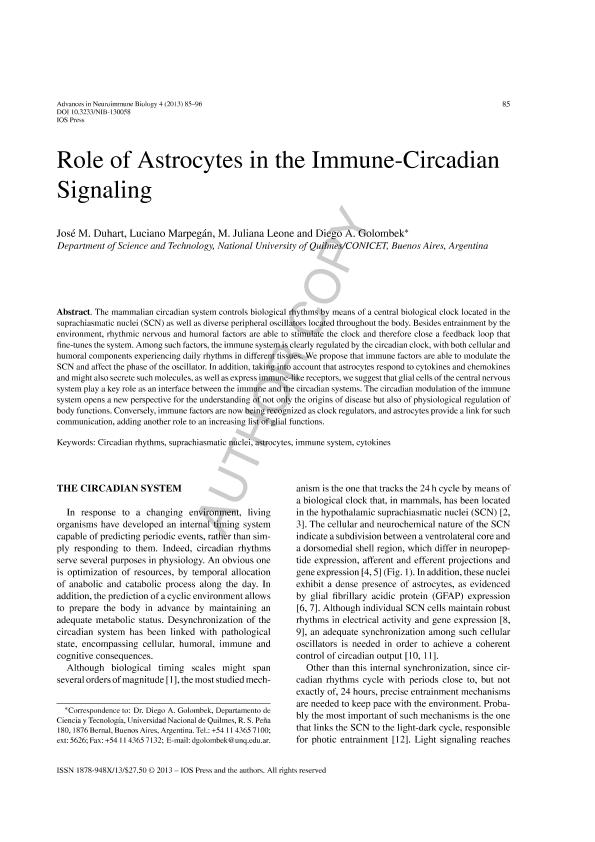Mostrar el registro sencillo del ítem
dc.contributor.author
Duhart, José Manuel

dc.contributor.author
Marpegan, Luciano

dc.contributor.author
Leone, Maria Juliana

dc.contributor.author
Golombek, Diego Andrés

dc.date.available
2017-11-15T20:26:47Z
dc.date.issued
2013-10
dc.identifier.citation
Duhart, José Manuel; Marpegan, Luciano; Leone, Maria Juliana; Golombek, Diego Andrés; Role of astrocytes in the immune-circadian signaling; IOS Press; Advances in Neuroimmune Biology; 4; 2; 10-2013; 85-96
dc.identifier.issn
1878-948X
dc.identifier.uri
http://hdl.handle.net/11336/28291
dc.description.abstract
The mammalian circadian system controls biological rhythms by means of a central biological clock located in the suprachiasmatic nuclei (SCN) as well as diverse peripheral oscillators located throughout the body. Besides entrainment by the environment, rhythmic nervous and humoral factors are able to stimulate the clock and therefore close a feedback loop that fine-tunes the system. Among such factors, the immune system is clearly regulated by the circadian clock, with both cellular and humoral components experiencing daily rhythms in different tissues. We propose that immune factors are able to modulate the SCN and affect the phase of the oscillator. In addition, taking into account that astrocytes respond to cytokines and chemokines and might also secrete such molecules, as well as express immune-like receptors, we suggest that glial cells of the central nervous system play a key role as an interface between the immune and the circadian systems. The circadian modulation of the immune system opens a new perspective for the understanding of not only the origins of disease but also of physiological regulation of body functions. Conversely, immune factors are now being recognized as clock regulators, and astrocytes provide a link for such communication, adding another role to an increasing list of glial functions.
dc.format
application/pdf
dc.language.iso
eng
dc.publisher
IOS Press

dc.rights
info:eu-repo/semantics/openAccess
dc.rights.uri
https://creativecommons.org/licenses/by-nc-sa/2.5/ar/
dc.subject
Circadian Rhythms
dc.subject
Suprachiasmatic Nuclei
dc.subject
Astrocytes
dc.subject
Immune System
dc.subject
Cytokines
dc.subject.classification
Otras Ciencias Biológicas

dc.subject.classification
Ciencias Biológicas

dc.subject.classification
CIENCIAS NATURALES Y EXACTAS

dc.title
Role of astrocytes in the immune-circadian signaling
dc.type
info:eu-repo/semantics/article
dc.type
info:ar-repo/semantics/artículo
dc.type
info:eu-repo/semantics/publishedVersion
dc.date.updated
2017-11-15T14:08:15Z
dc.journal.volume
4
dc.journal.number
2
dc.journal.pagination
85-96
dc.journal.pais
Estados Unidos

dc.description.fil
Fil: Duhart, José Manuel. Universidad Nacional de Quilmes. Departamento de Ciencia y Tecnología. Laboratorio de Cronobiología; Argentina. Consejo Nacional de Investigaciones Científicas y Técnicas; Argentina
dc.description.fil
Fil: Marpegan, Luciano. Universidad Nacional de Quilmes. Departamento de Ciencia y Tecnología. Laboratorio de Cronobiología; Argentina. Consejo Nacional de Investigaciones Científicas y Técnicas; Argentina
dc.description.fil
Fil: Leone, Maria Juliana. Universidad Nacional de Quilmes. Departamento de Ciencia y Tecnología. Laboratorio de Cronobiología; Argentina. Consejo Nacional de Investigaciones Científicas y Técnicas; Argentina
dc.description.fil
Fil: Golombek, Diego Andrés. Universidad Nacional de Quilmes. Departamento de Ciencia y Tecnología. Laboratorio de Cronobiología; Argentina. Consejo Nacional de Investigaciones Científicas y Técnicas; Argentina
dc.journal.title
Advances in Neuroimmune Biology
dc.relation.alternativeid
info:eu-repo/semantics/altIdentifier/url/https://content.iospress.com/articles/advances-in-neuroimmune-biology/nib130058
dc.relation.alternativeid
info:eu-repo/semantics/altIdentifier/doi/http://dx.doi.org/10.3233/NIB-130058
Archivos asociados
